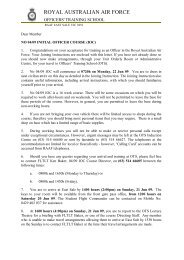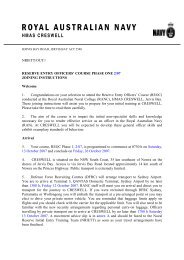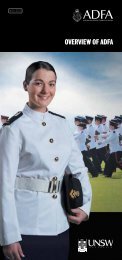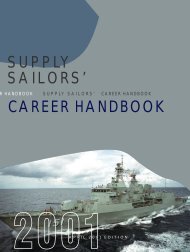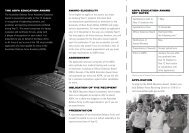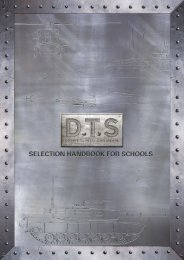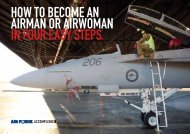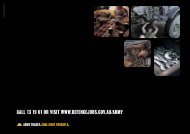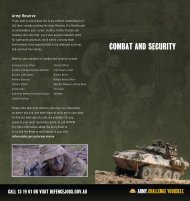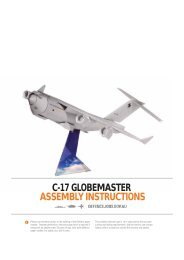what it takes to study at adfa - Australian Defence Force Recruiting
what it takes to study at adfa - Australian Defence Force Recruiting
what it takes to study at adfa - Australian Defence Force Recruiting
- No tags were found...
Create successful ePaper yourself
Turn your PDF publications into a flip-book with our unique Google optimized e-Paper software.
<strong>wh<strong>at</strong></strong> <strong>it</strong> <strong>takes</strong> <strong>to</strong> <strong>study</strong> <strong>at</strong> <strong>adfa</strong>in 2010/20111
BACHELOR OF ENGINEERING (BE) INAERONAUTICAL ENGINEERING UAC Code 450003Previous Entrance Scores2008 UAI 85.00 or ENTER 85.00 or ITI 85.00 or OP1-82007 UAI 85.00 or ENTER 85.00 or ITI 85.00 or OP1-82006 UAI 85.00 or ENTER 85.00 or ITI 85.00 or OP1-8Entrance scores are shown as a guide and are subject <strong>to</strong> change,for the most up <strong>to</strong> d<strong>at</strong>e inform<strong>at</strong>ion vis<strong>it</strong> www.unsw.<strong>adfa</strong>.edu.auDur<strong>at</strong>ion: Four years full-timeAssumed Subject Knowledge• English• M<strong>at</strong>hem<strong>at</strong>ics• Physics• Chemistry is desirable, but not essentialAeronautical Engineering in an ADF CareerNavy BE (Aero) gradu<strong>at</strong>es are required for maintenance and repair,modific<strong>at</strong>ions, oper<strong>at</strong>ional deployments and airworthiness of Navy’sfleet of rotary-wing aircraft. Army BE (Aero) gradu<strong>at</strong>es are most likely<strong>to</strong> be involved in the maintenance and repair of the Army’s rapidlygrowing fleet of fixed-wing and rotary-wing aircraft. Air <strong>Force</strong> BE(Aero) gradu<strong>at</strong>es may be involved in the oper<strong>at</strong>ion and maintenanceof aircraft and then become responsible for the airworthinessand modific<strong>at</strong>ion of aircraft and engines, or the acquis<strong>it</strong>ion andintroduction of new equipment in<strong>to</strong> the Service.For more inform<strong>at</strong>ion on the disciplines and how they f<strong>it</strong> in<strong>to</strong> yourADF career vis<strong>it</strong> www.defencejobs.gov.au/<strong>adfa</strong>OverviewAeronautical Engineering is the <strong>study</strong> of the design, development,manufacture, maintenance and control of vehicles oper<strong>at</strong>ing inthe earth’s <strong>at</strong>mosphere or in outer space. Such vehicles requirethe highest standard of engineering as they have <strong>to</strong> be very lightrel<strong>at</strong>ive <strong>to</strong> the loads they carry, and yet be strong and reliable asthe consequences of failure are drastic. Aircraft are cr<strong>it</strong>ical <strong>to</strong> theoper<strong>at</strong>ions of all the Services in the ADF, and Aeronautical Engineersare employed in all Services, although n<strong>at</strong>urally the major<strong>it</strong>y are in theRoyal <strong>Australian</strong> Air <strong>Force</strong>.Although <strong>at</strong> present the ADF does not design or build aircraft, asan ADF engineer, you have <strong>to</strong> ensure th<strong>at</strong> aircraft are supplied andmaintained <strong>to</strong> the highest standards, using the correct parts andm<strong>at</strong>erials installed w<strong>it</strong>h best-practice workmanship. At the sametime you have <strong>to</strong> manage these activ<strong>it</strong>ies w<strong>it</strong>h extreme efficiencyas maintaining an air fleet during oper<strong>at</strong>ions is time-cr<strong>it</strong>ical. Theaeronautical maintenance engineer therefore needs high-level projectmanagement skills as well as an engineering expertise.The Aeronautical Engineering program has been developed <strong>to</strong>meet the needs of the ADF and covers the design, reliabil<strong>it</strong>y andmaintenance of fixed-wing and rotary-wing aircraft.8 9
BACHELOR OF ENGINEERING (BE) IN CIVILENGINEERING UAC Code 450004BACHELOR OF ENGINEERING (BE) IN ELECTRICALENGINEERING UAC Code 450005Previous Entrance Scores2008 UAI 85.00 or ENTER 85.00 or ITI 85.00 or OP1-82007 UAI 85.00 or ENTER 85.00 or ITI 85.00 or OP1-82006 UAI 85.00 or ENTER 85.00 or ITI 85.00 or OP1-8Entrance scores are shown as a guide and are subject <strong>to</strong> change,for the most up <strong>to</strong> d<strong>at</strong>e inform<strong>at</strong>ion vis<strong>it</strong> www.unsw.<strong>adfa</strong>.edu.auDur<strong>at</strong>ion: Four years full-timeAssumed Subject Knowledge• English• M<strong>at</strong>hem<strong>at</strong>ics• Physics• Chemistry is desirable, but not essentialOverviewThe general training in science and technology offered by a CivilEngineering degree provides an ideal basis for a career in modernsociety. In add<strong>it</strong>ion <strong>to</strong> the direct employment in one of the manyspecial<strong>it</strong>ies of Civil Engineering, many rel<strong>at</strong>ed careers are possible.As the ADF become progressively more technologically based, theeduc<strong>at</strong>ion provided in a Civil Engineering degree will be ingre<strong>at</strong>er demand.Civil Engineering in an ADF CareerGradu<strong>at</strong>es in Civil Engineering can take responsibil<strong>it</strong>y for the designand construction of infrastructure, base facil<strong>it</strong>ies and field engineeringassoci<strong>at</strong>ed w<strong>it</strong>h ADF projects and mil<strong>it</strong>ary activ<strong>it</strong>ies. Environmentalmanagement plays a major part in these projects. Civil Engineersin the ADF are also involved w<strong>it</strong>h development and peacekeepingactiv<strong>it</strong>ies in the South Pacific and elsewhere in the world.Most Army gradu<strong>at</strong>es will join the Royal <strong>Australian</strong> Engineers (RAE)which is a very challenging career. As well as providing infrastructurew<strong>it</strong>hin <strong>Australian</strong> borders, much of your early career is spent inoverseas deployments. Army Civil Engineers have played key rolesin East Timor, Iraq, Solomon Islands, Banda Aceh – in fact anywhereAustralia is engaged in conflict, peacekeeping or disaster recovery,RAE’s Civil Engineers are there supplying clean w<strong>at</strong>er, constructingaccommod<strong>at</strong>ion, building airfields, res<strong>to</strong>ring harbours, improvingdefence against nuclear, biological and chemical <strong>at</strong>tacks.Royal <strong>Australian</strong> Air <strong>Force</strong> Civil Engineers play a major role inmanaging the infrastructure of the Air <strong>Force</strong>. The projects they areresponsible for could be of a specialised engineering n<strong>at</strong>ure (aircraftpavements, hangars, hosp<strong>it</strong>als and pollution control) or they could beresponsible for management of whole facil<strong>it</strong>ies.For more inform<strong>at</strong>ion on the disciplines and how they f<strong>it</strong> in<strong>to</strong> yourADF career vis<strong>it</strong> www.defencejobs.gov.au/<strong>adfa</strong>Previous Entrance Scores2008 UAI 85.00 or ENTER 85.00 or ITI 85.00 or OP1-82007 UAI 85.00 or ENTER 85.00 or ITI 85.00 or OP1-82006 UAI 85.00 or ENTER 85.00 or ITI 85.00 or OP1-8Entrance scores are shown as a guide and are subject <strong>to</strong> change,for the most up <strong>to</strong> d<strong>at</strong>e inform<strong>at</strong>ion vis<strong>it</strong> www.unsw.<strong>adfa</strong>.edu.auDur<strong>at</strong>ion: Four years full-timeAssumed Subject Knowledge• English• M<strong>at</strong>hem<strong>at</strong>ics• Physics• Chemistry is desirable, but not essentialOverviewThe Bachelor of Engineering in Electrical Engineering is built on afound<strong>at</strong>ion of m<strong>at</strong>hem<strong>at</strong>ics, computer science and physical science.A small component of Electrical Engineering is introduced in thefirst year, w<strong>it</strong>h progressively larger components in second and thirdyears. The final year is devoted exclusively <strong>to</strong> Electrical Engineeringcourses. In your final year, you’ll have the option <strong>to</strong> specialise inareas such as communic<strong>at</strong>ions, surveillance and radar, computerengineering and guided weapons electronics. You’ll also undertake amajor project supervised by a member of academic staff.ADFA provides one of the best Electrical Engineering programsavailable and is supported by a well-equipped labora<strong>to</strong>ry andexcellent library facil<strong>it</strong>ies.Electrical Engineering in an ADF CareerIn conjunction w<strong>it</strong>h the technical Sailors in their charge, a WeaponsElectrical Engineer in the Royal <strong>Australian</strong> Navy (RAN) is responsiblefor looking after weapons systems, communic<strong>at</strong>ion systems andsensor systems on the Navy’s warships. Opportun<strong>it</strong>ies also exist foryou <strong>to</strong> join the RAN submarine service and serve in one of Australia’ssubmarines. Regardless of your choice, Electrical Engineers facemany challenges from these complex warships and submarines, andfrom harsh environments in which you could work. Over time, therewill be opportun<strong>it</strong>ies for a range of “shore” postings, which couldinclude working on projects <strong>to</strong> acquire new warships or new navalsystems <strong>to</strong> go on<strong>to</strong> Australia’s existing warships and submarines.On gradu<strong>at</strong>ion, as a junior Army Electrical Engineering Officer, you’llchoose between the Royal <strong>Australian</strong> Electrical and MechanicalEngineers (RAEME) or Royal <strong>Australian</strong> Signals (RASigs) corps.Regardless of your choice, you’ll find yourself leading a number oftechnical Soldiers responsible for maintenance and support of anyone of a number of systems as diverse as rotary-winged aircraft,ground-based telecommunic<strong>at</strong>ions systems, ground-based radar andweapons systems. These systems might be on a base or in the field.You may eventually find yourself employed as engineering author<strong>it</strong>iesin the acquis<strong>it</strong>ion projects th<strong>at</strong> keep the <strong>Australian</strong> Army <strong>at</strong> theforefront of technology.As an Air <strong>Force</strong> Electrical Engineer, you’ll have a fantastic range ofemployment options when you gradu<strong>at</strong>e from univers<strong>it</strong>y. You maychoose <strong>to</strong> work w<strong>it</strong>h aircraft on systems responsible for airborneelectrical gener<strong>at</strong>ion and distribution, radar and weapons systems,flight controls systems and airborne communic<strong>at</strong>ions systems.Aerospace Engineer Officer – Electronics will be involved w<strong>it</strong>hmaintenance, technical investig<strong>at</strong>ions and trial modific<strong>at</strong>ions <strong>to</strong>aircraft. Other engineers could choose <strong>to</strong> work w<strong>it</strong>h ground-basedtechnology like radar, s<strong>at</strong>ell<strong>it</strong>e or communic<strong>at</strong>ions systems.Regardless of your choice, gradu<strong>at</strong>es generally lead a group ofhighly-skilled technical Airmen during their early years and movein<strong>to</strong> technical acquis<strong>it</strong>ion and project management roles l<strong>at</strong>er intheir careers.For more inform<strong>at</strong>ion on the disciplines and how they f<strong>it</strong> in<strong>to</strong> yourADF career vis<strong>it</strong> www.defencejobs.gov.au/<strong>adfa</strong>10 11
BACHELOR OF ENGINEERING (BE) IN MECHANICALENGINEERING UAC Code 450006Previous Entrance Scores2008 UAI 85.00 or ENTER 85.00 or ITI 85.00 or OP1-82007 UAI 85.00 or ENTER 85.00 or ITI 85.00 or OP1-82006 UAI 85.00 or ENTER 85.00 or ITI 85.00 or OP1-8Entrance scores are shown as a guide and are subject <strong>to</strong> change,for the most up <strong>to</strong> d<strong>at</strong>e inform<strong>at</strong>ion vis<strong>it</strong> www.unsw.<strong>adfa</strong>.edu.auDur<strong>at</strong>ion: Four years full-timeAssumed Subject Knowledge• English• M<strong>at</strong>hem<strong>at</strong>ics• Physics• Chemistry is desirable, but not essentialOverviewThe technical challenge of harnessing and utilising the immense newpower source discovered in the last couple of hundred years hasgiven a rise <strong>to</strong> the profession of Mechanical Engineering. A core taskof a Mechanical Engineer is <strong>to</strong> devise new and better ways <strong>to</strong> extractmechanical power from he<strong>at</strong> and <strong>to</strong> use th<strong>at</strong> power <strong>to</strong> perform auseful task. This also concerns machine control, (including au<strong>to</strong>m<strong>at</strong>iccontrol), lubric<strong>at</strong>ion, he<strong>at</strong>ing and cooling (including air cond<strong>it</strong>ioning)and vibr<strong>at</strong>ion of machines. Mechanical Engineers are required <strong>to</strong>understand a number of fields, such as: thermodynamics; mechanicalsystems dynamics; properties of solid m<strong>at</strong>erials; fluid dynamics;design and management.As a Navy BE (Mech), you will undertake courses <strong>to</strong> enhance yourprofessional development as a Naval Officer and Marine Engineer. Asa Marine Engineering Officer you are the technical author<strong>it</strong>y on boardship and responsible for the ship’s structures, propulsion systems,electrical gener<strong>at</strong>ion and distribution, domestic and associ<strong>at</strong>edmechanical services. Your responsibil<strong>it</strong>ies will also include the mainand auxiliary machinery, engines, au<strong>to</strong>m<strong>at</strong>ic and remote controlsystems, hydraulics, air cond<strong>it</strong>ioning and refriger<strong>at</strong>ion, ventil<strong>at</strong>ionsystems and electrical power gener<strong>at</strong>ion and conversion equipment.As an Army BE (Mech), you can expect <strong>to</strong> be posted <strong>to</strong> the Royal<strong>Australian</strong> Electrical and Mechanical Engineers (RAEME), Armour,or Infantry Corps. Typically, you will work in e<strong>it</strong>her mobile orst<strong>at</strong>ic workshops or headquarters or be involved w<strong>it</strong>h equipmentprocurement. The Corps provides the repair and recovery service forall equipment oper<strong>at</strong>ed by the Army, including aircraft and w<strong>at</strong>ercraft.RAEME Soldiers repair and maintain equipment as diverse as tanks,trucks and armoured personnel carriers, helicopters, radios, radarsand computers, artillery guns and missile systems.As an Air <strong>Force</strong> BE (Mech), you’ll play a major role in managing theequipment of the Air <strong>Force</strong>.For more inform<strong>at</strong>ion on the disciplines and how they f<strong>it</strong> in<strong>to</strong> yourADF career vis<strong>it</strong> www.defencejobs.gov.au/<strong>adfa</strong>Mechanical Engineering in an ADF CareerAll three services employ Mechanical Engineers <strong>to</strong> maintain andrepair an extremely diverse and sophistic<strong>at</strong>ed range of equipment,including land transport vehicles, ships, tanks, armoured personnelcarriers and weapons systems. No other organis<strong>at</strong>ion in Australia hassuch a complex and challenging equipment inven<strong>to</strong>ry oper<strong>at</strong>ing undersuch demanding cond<strong>it</strong>ions.1213
BACHELOR OF TECHNOLOGY (AERONAUTICALENGINEERING) (BTECH (AERO)) UAC Code 450007Previous Entrance Scores2008 UAI 85.00 or ENTER 85.00 or ITI 85.00 or OP1-82007 UAI 85.00 or ENTER 85.00 or ITI 85.00 or OP1-82006 UAI 85.00 or ENTER 85.00 or ITI 85.00 or OP1-8Entrance scores are shown as a guide and are subject <strong>to</strong> change,for the most up <strong>to</strong> d<strong>at</strong>e inform<strong>at</strong>ion vis<strong>it</strong> www.unsw.<strong>adfa</strong>.edu.auDur<strong>at</strong>ion: Three years full-timeAssumed Subject Knowledge• English• M<strong>at</strong>hem<strong>at</strong>ics• Physics• Chemistry is desirable, but not essentialOverviewThis degree program is designed for those wishing <strong>to</strong> work in theADF as an Aeronautical Engineering Technologist but not necessarilyas a fully-qualified Engineer. Engineers Australia accred<strong>it</strong>s thisthree-year technology program <strong>at</strong> the Engineering Technologistlevel. At the discretion of the Services, there is provision for you ifyou have completed the BTech and wish <strong>to</strong> upgrade <strong>to</strong> a Bachelorof Engineering degree in Aeronautical Engineering by undertakingeighteen months of further <strong>study</strong> <strong>at</strong> a l<strong>at</strong>er stage. This degree shouldnot be confused w<strong>it</strong>h the BTech (Av) degree which is designedspecifically for Pilots.BACHELOR OF TECHNOLOGY (AVIATION)(BTECH (AV)) UAC Code 450008Previous Entrance Scores2008 UAI 80.75 or ENTER 80.75 or ITI 80.75 or OP1-102007 UAI 80.75 or ENTER 80.75 or ITI 80.75 or OP1-102006 UAI 80.75 or ENTER 80.75 or ITI 80.75 or OP1-10Entrance scores are shown as a guide and are subject <strong>to</strong> change,for the most up <strong>to</strong> d<strong>at</strong>e inform<strong>at</strong>ion vis<strong>it</strong> www.unsw.<strong>adfa</strong>.edu.auDur<strong>at</strong>ion: Three years full-timeAssumed Subject Knowledge• English• M<strong>at</strong>hem<strong>at</strong>ics• Physics• Chemistry is desirable, but not essentialOverviewThe Bachelor of Technology (Av) program is designed for potentialPilots entering the ADF. Acceptance in<strong>to</strong> the degree is cond<strong>it</strong>ional onpassing apt<strong>it</strong>ude tests conducted by the ADF’s Basic Flying TrainingSchool. The program covers both the technical and organis<strong>at</strong>ionalaspects of flying, w<strong>it</strong>h a concentr<strong>at</strong>ion on the safety of avi<strong>at</strong>ion as awhole and highlights the safe practices of the components th<strong>at</strong> makeup avi<strong>at</strong>ion: for example, pilot, maintenance and air traffic control.THE CHIEF OF DEFENCE (CDF) FORCESTUDENTS PROGRAMSCDF Program for Academically Gifted StudentsThe <strong>Australian</strong> <strong>Defence</strong> <strong>Force</strong> Academy offers an exc<strong>it</strong>ing range ofundergradu<strong>at</strong>e degree options if you are a high-performer in Arts,Business, Engineering, Science and Technology. Known as theChief of <strong>Defence</strong> <strong>Force</strong> Students Programs (CDFSP), these uniqueprograms have been designed <strong>to</strong> provide academically-giftedstudents w<strong>it</strong>h a rich and challenging educ<strong>at</strong>ional experience th<strong>at</strong>will develop their cr<strong>it</strong>ical thinking and research skills. If you areeligible for the CDFSP, you will undertake individual research projectsworking closely w<strong>it</strong>h academic staff on projects from their area ofinterest. Upon completion of your degree, you will receive a uniqueaward th<strong>at</strong> reflects your involvement in this outstanding program.The CDFSPs are offered across all five schools of the Academy andis an exceptional opportun<strong>it</strong>y for gifted students <strong>to</strong> reach their fullacademic potential.All students enrolling in the CDFSP are expected <strong>to</strong> maintain a highlevel of academic and mil<strong>it</strong>ary performance over all sessions in order<strong>to</strong> remain w<strong>it</strong>hin the program. This requirement varies across thedifferent degree programs. If you do not maintain the required level ofperformance, you will be transferred <strong>to</strong> the standard degree programoffered <strong>at</strong> the Academy w<strong>it</strong>h cred<strong>it</strong> for all courses completed.Assumed Subject KnowledgeThe assumed knowledge requirements of the CDFSPs are the sameas the corresponding standard degree.Aeronautical Technology in an ADF CareerThe BTech (Aero) is primarily undertaken by Air <strong>Force</strong> OfficerCadets who intend <strong>to</strong> become Aircrew and wish <strong>to</strong> enhance theirunderstanding of the oper<strong>at</strong>ion and performance of aircraft. However,the program is also available <strong>to</strong> Cadets in any of the Services andgradu<strong>at</strong>es are employed in many technical branches of the ADF.For more inform<strong>at</strong>ion on the disciplines and how they f<strong>it</strong> in<strong>to</strong> yourADF career vis<strong>it</strong> www.defencejobs.gov.au/<strong>adfa</strong>Engineers Australia accred<strong>it</strong>s this three-year technology program <strong>at</strong>the Engineering Technologist level.Avi<strong>at</strong>ion Technology in an ADF CareerStudents who undertake a Bachelor of Technology in Avi<strong>at</strong>ion areprimarily Midshipmen and Officer Cadets who have been selected forpilot training in the Navy and Air <strong>Force</strong>. Your studies will consist ofacademic <strong>study</strong> and practical flying components, and are undertaken<strong>at</strong> ADFA. The flying component of the degree, is currently presented<strong>at</strong> Tamworth, NSW and Pearce, WA.For more inform<strong>at</strong>ion on the disciplines and how they f<strong>it</strong> in<strong>to</strong> yourADF career vis<strong>it</strong> www.defencejobs.gov.au/<strong>adfa</strong>Entry and Progression RequirementsTo gain entry <strong>to</strong> the CDFSP, you must apply through the Univers<strong>it</strong>yAdmissions Centre and achieve the following entrance score foradmission <strong>to</strong> the programs:Bachelor of Arts UAC Code 450010UAI 95 or ENTER 95 or ITI 95 or OP1-4Bachelor of Business UAC Code 450010UAI 95 or ENTER 95 or ITI 95 or OP1-4Bachelor of Science UAC Code 450011UAI 98 or ENTER 98 or ITI 98 or OP1-2Bachelor of Engineering (all specific<strong>at</strong>ions) UAC Code 450011UAI 98 or ENTER 98 or ITI 98 or OPI-2Bachelor of Technology (Aeronautical) UAC Code 450011UAI 98 or ENTER 98 or ITI 98 or OPI-2If you do not in<strong>it</strong>ially obtain a high enough entrance score foradmission in<strong>to</strong> the CDFSP, you may apply <strong>to</strong> transfer from a standardAcademy degree <strong>to</strong> the program if you achieve outstanding academicresults during your first year of <strong>study</strong> <strong>at</strong> the Academy.14 15
MILITARY STUDIESOver a three year period you’ll learn the fundamental knowledge,skills and <strong>at</strong>t<strong>it</strong>udes required by junior officers in the ADF. The mil<strong>it</strong>arytraining program consists of two key components – AcademyMil<strong>it</strong>ary Educ<strong>at</strong>ion and Training (AMET) and Single ServiceTraining (SST).Academy Mil<strong>it</strong>ary Educ<strong>at</strong>ion and TrainingThe Academy Mil<strong>it</strong>ary Educ<strong>at</strong>ion and Training (AMET) programis carried out in ‘blocks’ <strong>at</strong> the beginning and end of the year andsix hours per week during academic sessions. You’ll find there isa significant emphasis on cre<strong>at</strong>ing experience based leadershipopportun<strong>it</strong>ies in the training activ<strong>it</strong>ies. The AMET program includessubjects such as:Leadership StudiesDevelop leadership skills th<strong>at</strong> prepare you <strong>to</strong> take your placeas a junior officer in the ADF.Drill and CeremonialThis promotes reaction <strong>to</strong> command, self-discipline and teamworkthrough knowledge and practice of the cus<strong>to</strong>ms and trad<strong>it</strong>ions ofmil<strong>it</strong>ary ceremonies.Field CraftThis introduces you <strong>to</strong> living in the field as a member of a groupand survival in adverse circumstances.Mil<strong>it</strong>ary LawThis introduces you <strong>to</strong> the <strong>Australian</strong> <strong>Defence</strong> <strong>Force</strong> Discipline Actand the Geneva Conventions. The subject is designed <strong>to</strong> enable you<strong>to</strong> function in the ADFA environment w<strong>it</strong>h more detailed trainingbeing conducted nearer <strong>to</strong> the time you become a full Officer inthe ADF.Physical TrainingThis teaches you f<strong>it</strong>ness, strength and agil<strong>it</strong>y. Physical trainingclasses are conducted during the weekly mil<strong>it</strong>ary training program.As sport and a high standard of physical f<strong>it</strong>ness are important partsof ADF life, you are encouraged <strong>to</strong> obtain a coaching or refereeingqualific<strong>at</strong>ion for <strong>at</strong> least one sport.Weapons TrainingThis gives you training in the oper<strong>at</strong>ion and maintenance of smallarms Service weapons.Mil<strong>it</strong>ary Communic<strong>at</strong>ion ProgramThis is designed <strong>to</strong> develop confidence and effectiveness in youroral and wr<strong>it</strong>ten communic<strong>at</strong>ion skills which are necessary foryour mil<strong>it</strong>ary career.Equ<strong>it</strong>y and Divers<strong>it</strong>y TrainingThis provides you w<strong>it</strong>h the skills <strong>to</strong> live, <strong>study</strong> and develop in ahealthy academic and social environment by teaching you how <strong>to</strong>tre<strong>at</strong> people fairly and w<strong>it</strong>h respect in accordance w<strong>it</strong>h ADF policies.First Aid and HealthExamines the impact on society of drug and alcohol abuse andteaches you first aid and prevent<strong>at</strong>ive health techniques.1617
SINGLE SERVICE TRAININGSingle Service Training (SST) is generally conducted <strong>at</strong> the beginningand end of the year for varying periods of time and gives you theopportun<strong>it</strong>y <strong>to</strong> experience and learn about your parent Service. TheServices (Navy, Army and Air <strong>Force</strong>) are responsible for the designand implement<strong>at</strong>ion of the syllabi for the conduct of SST which areoutlined below.NavyOn joining the Royal <strong>Australian</strong> Navy, most Midshipmen completein<strong>it</strong>ial officer training <strong>at</strong> HMAS Creswell <strong>at</strong> Jervis Bay, followed by asix-month consolid<strong>at</strong>ion period in the fleet, prior <strong>to</strong> commencing <strong>at</strong>ADFA. In your second and third years, you will go <strong>to</strong> sea in a varietyof ships where you will work alongside Sailors <strong>to</strong> gain an appreci<strong>at</strong>ionof shipboard life. If you’re <strong>study</strong>ing engineering, you’ll also undertakeperiods of work experience during your Naval training. Navy Pilotsand Observers go directly <strong>to</strong> ADFA.ArmySST for Army Officer Cadets is conducted <strong>at</strong> the Royal Mil<strong>it</strong>aryCollege (RMC) Duntroon in Canberra, and other Army establishmentsin New South Wales and Vic<strong>to</strong>ria. This <strong>takes</strong> you <strong>to</strong> the level of <strong>at</strong>rained soldier. The training includes weapons handling, field craft,navig<strong>at</strong>ion and tactics <strong>at</strong> pla<strong>to</strong>on level.The calendar looks something like this:Number of Weeks Activ<strong>it</strong>yNo. of Weeks4Activ<strong>it</strong>yYear One Familiaris<strong>at</strong>ion Training (YOFT) or Academy Mil<strong>it</strong>aryEduc<strong>at</strong>ion and Training (AMET) and/or Single Service Training (SST)1 Chief of the <strong>Defence</strong> <strong>Force</strong> Parade162 Examin<strong>at</strong>ionsSemester 1 academic studies (this period includes a two-week recessof career development and field trips which can be e<strong>it</strong>her academic ormil<strong>it</strong>ary in n<strong>at</strong>ure)2 Mid-year leave and/or SST and/or Service Attachments152 Examin<strong>at</strong>ionsSemester 2 academic studies (this period includes a one-week recessof career development and field trips which can be e<strong>it</strong>her academic ormil<strong>it</strong>ary in n<strong>at</strong>ure)3 AMET and/or SST1Gradu<strong>at</strong>ion (all Midshipmen and Officer Cadets particip<strong>at</strong>e ingradu<strong>at</strong>ion activ<strong>it</strong>ies)5 End of year leaveAir <strong>Force</strong>Air <strong>Force</strong> SST is designed <strong>to</strong> allow you <strong>to</strong> complete your Air <strong>Force</strong>In<strong>it</strong>ial Officer Course during your time <strong>at</strong> ADFA. The training includesgeneral Air <strong>Force</strong> knowledge, ground defence training and air powerknowledge. It also includes elements <strong>to</strong> motiv<strong>at</strong>e you <strong>to</strong>wards yourchosen branch in the Air <strong>Force</strong>. In your second year you will spendfive weeks <strong>at</strong> the Officer Training School <strong>at</strong> RAAF Base East Salein Vic<strong>to</strong>ria.As well as the academic and mil<strong>it</strong>ary studies you can also particip<strong>at</strong>ein adventure based training like wh<strong>it</strong>ew<strong>at</strong>er rafting and trekking.1819
ADF CAREERS20There’s a huge range of exc<strong>it</strong>ing jobs available in the ADF th<strong>at</strong> offerfar gre<strong>at</strong>er benef<strong>it</strong>s than working in the civilian world. The tableis a snap shot th<strong>at</strong> shows the advantages of working for the ADFcompared <strong>to</strong> a civilian job.Work for your country or work for a boss?ADF18% Super 9% SuperSubsidised food and accommod<strong>at</strong>ionOverseas TravelFree Medical and Dental Tre<strong>at</strong>mentGet paid <strong>to</strong> <strong>study</strong>Civilian WorkforceYou have <strong>to</strong> pay for theseYou have <strong>to</strong> payYou have <strong>to</strong> payYou have <strong>to</strong> payThere are all kinds of officer pos<strong>it</strong>ions available <strong>to</strong> you in manydifferent fields from Administr<strong>at</strong>ion and Logistics through <strong>to</strong> Avi<strong>at</strong>ion,Intelligence and Engineering. You could become a Seaman Officerin the Navy, a Civil Engineer in the Army, or even a Pilot in the Air<strong>Force</strong>. There are hundreds of exc<strong>it</strong>ing jobs <strong>to</strong> choose from in theADF. You nomin<strong>at</strong>e which job you wish <strong>to</strong> pursue as part of the ADFAapplic<strong>at</strong>ion process. The exception is the Army, where you willnomin<strong>at</strong>e your preferred pos<strong>it</strong>ion whilst <strong>at</strong> the Royal Mil<strong>it</strong>ary College(RMC) Duntroon. Upon gradu<strong>at</strong>ion from ADFA you will go on <strong>to</strong>complete your in<strong>it</strong>ial employment training for your chosen career.ADFA Navy CareersAerospace Engineer OfficerAerospace Engineer – Weapons Electrical AircraftAvi<strong>at</strong>ion Officer – ObserverAvi<strong>at</strong>ion Officer – PilotMarine Engineer OfficerSeaman OfficerSupply OfficerWeapons Electrical Engineer OfficerADFA Army CareersArmoured Corps OfficerArtillery OfficerElectrical and Mechanical Engineer Corps Officer– Electrical Engineering Officer– Mechanical Engineering OfficerEngineer Corps Officer– Aeronautical Engineering Officer– Civil Engineer– Geom<strong>at</strong>ic EngineerInfantry OfficerIntelligence Corps OfficerMil<strong>it</strong>ary Police OfficerOrdnance Corps OfficerPilot – General Service OfficerSignals Corps Officer – Computer Science OfficerTransport Corps OfficerADFA Air <strong>Force</strong> CareerSAdministr<strong>at</strong>ive OfficerAerospace Engineer– Aeronautical Engineer Officer– Armament Engineer Officer– Electronics Engineer OfficerAir Comb<strong>at</strong> OfficerAir Traffic ControllerAirfield Engineer OfficerIntelligence OfficerLogistics OfficerPilotFor detailed job descriptions vis<strong>it</strong> www.defencejobs.gov.auWHAT DO YOU HAVE TO GIVE BACK?As an ADFA student, you’ll be required <strong>to</strong> serve for an In<strong>it</strong>ialMinimum Period of Service (IMPS). This is <strong>to</strong> ensure the Services getan acceptable return for investing in your training. Essentially <strong>it</strong> is aperiod of time you will be required <strong>to</strong> serve until you can voluntarilyresign. The length of IMPS varies between jobs. You’ll become liablefor your IMPS upon gradu<strong>at</strong>ing from your second year of studies.This means th<strong>at</strong> you may leave the ADFA <strong>at</strong> any time up <strong>to</strong> the end ofsecond year, w<strong>it</strong>hout any oblig<strong>at</strong>ion. For further inform<strong>at</strong>ion on IMPS,speak <strong>to</strong> an ADF Careers Counsellor <strong>at</strong> a <strong>Defence</strong> <strong>Force</strong> Recru<strong>it</strong>ingCentre loc<strong>at</strong>ed near you.21
the <strong>adfa</strong> duaL adMission PRoCessApplying for ADFA is a dual applic<strong>at</strong>ion process. You must complete both processes listed below <strong>to</strong> gain successfuladmission in<strong>to</strong> ADFA. These processes should be completed concurrently.defenCe PRoCessuniVeRs<strong>it</strong>y PRoCessContact <strong>Defence</strong> <strong>Force</strong>Recru<strong>it</strong>ing 13 19 01Attend a Your Opportun<strong>it</strong>iesUnlim<strong>it</strong>ed (YOU) sessionAttend an OfficerSelection BoardReceive offer fromthe ADFAccept ADF offerWelcome <strong>to</strong>ADFAThink about your degree optionswww.unsw.<strong>adfa</strong>.edu.auDecide which degreeyou will apply forApply for UNSW@ADFAthrough the Univers<strong>it</strong>iesAdmissions Centre (UAC)www.uac.edu.auAccept UAC OfferELIGIBILITY FOR ADFATo be eligible for ADFA you should be in <strong>at</strong> least Year 11 <strong>at</strong> schooland undertaking a tertiary package, or have completed Year 12 w<strong>it</strong>han entrance rank th<strong>at</strong> will qualify you for entry in<strong>to</strong> UNSW. Afterapplying, you’ll go through a selection process th<strong>at</strong> will determineyour physical and mental f<strong>it</strong>ness and your su<strong>it</strong>abil<strong>it</strong>y <strong>to</strong> become anofficer in the ADF. All applic<strong>at</strong>ions <strong>to</strong> ADFA must be subm<strong>it</strong>ted <strong>to</strong> a<strong>Defence</strong> <strong>Force</strong> Recru<strong>it</strong>ing Centre (DFRC) or call 13 19 01 forfurther inform<strong>at</strong>ion.An offer by the ADF <strong>to</strong> <strong>study</strong> <strong>at</strong> ADFA is cond<strong>it</strong>ional on meeting theeduc<strong>at</strong>ional admission requirements for UNSW.eligibil<strong>it</strong>y for unswAdmission <strong>to</strong> UNSW is based on academic mer<strong>it</strong>. You will beconsidered for admission <strong>to</strong> undergradu<strong>at</strong>e programs <strong>at</strong> UNSW onthe basis of your academic performance in:• <strong>Australian</strong> and New Zealand final secondary studies and/or• post-secondary or tertiary qualific<strong>at</strong>ions and/or• overseas qualific<strong>at</strong>ions considered equivalent <strong>to</strong> <strong>Australian</strong>studies and/or• an altern<strong>at</strong>ive entry schemeApplicants must meet the published minimum entrance rankidentified for a specific degree.Though there are no specific prerequis<strong>it</strong>e requirements for entry <strong>to</strong>UNSW undergradu<strong>at</strong>e degrees <strong>it</strong> will be assumed candid<strong>at</strong>es havestudied certain subject areas in their final year of high school.ASSUMED SUBJECT KNOWLEDGEAssumed Subject Knowledge is the level of subject knowledgeth<strong>at</strong> a lecturer or a tu<strong>to</strong>r of a first year UNSW@ADFA course couldreasonably expect all students enrolled in th<strong>at</strong> course <strong>to</strong> know <strong>at</strong>the outset.If you do not have the level of Assumed Subject Knowledge, youare NOT prevented from applying for admission or enrolling whenthe program begins, but you may be placed <strong>at</strong> a considerabledisadvantage. If you have not achieved the recommended levelof Assumed Subject Knowledge, you are strongly advised th<strong>at</strong> <strong>it</strong>is in you best interest <strong>to</strong> undertake a bridging program or otherAssumed Subject Knowledge Expressed by DegreeYear 11 and 12 subject choices are important <strong>to</strong> meet UNSWAssumed Subject Knowledge requirements. Further inform<strong>at</strong>ion canbe found <strong>at</strong> www.unsw.<strong>adfa</strong>.edu.au/student*Assumed subject knowledge for specific subject areas undertakenthe BA or BSc:ADF service requirementsYou should be aware th<strong>at</strong> in add<strong>it</strong>ion <strong>to</strong> the UNSW Assumed SubjectKnowledge requirements, there may be add<strong>it</strong>ional ADF requirements.Contact <strong>Defence</strong> <strong>Force</strong> Recru<strong>it</strong>ing on 13 19 01 for more inform<strong>at</strong>ion.BONUS POINT SCHEMEUNSW has introduced a n<strong>at</strong>ional bonus point scheme for Year 12students. This is in recogn<strong>it</strong>ion of the strong correl<strong>at</strong>ion between Year12 subject performance and prepar<strong>at</strong>ion for, and success in, first yearunivers<strong>it</strong>y studies. If you have undertaken, and done well in, relevantYear 12 subjects, you are generally well prepared for the demands ofunivers<strong>it</strong>y <strong>study</strong>.The bonus point scheme will be available <strong>to</strong> all programs offeredby ADFA except for all Chief of <strong>Defence</strong> <strong>Force</strong> Special Programs.For inform<strong>at</strong>ion about the bonus point scheme, selection ofYear 12 subjects and the required performance level vis<strong>it</strong>www.unsw.<strong>adfa</strong>.edu.au/studentprepar<strong>at</strong>ion course.2223Bachelor ofEngineering(Aeronautical,Civil, Electrical& Mechanical)EnglishM<strong>at</strong>hem<strong>at</strong>icsPhysicsChemistry(desirable notessential)Bachelor ofTechnology(Aeronautical& Avi<strong>at</strong>ion)EnglishM<strong>at</strong>hem<strong>at</strong>icsPhysicsChemistry(desirable notessential)Bachelor ofScience*Bachelor ofArts*Bachelor ofBusinessEnglish English EnglishM<strong>at</strong>hem<strong>at</strong>ics Physics Chemistry OceanographyM<strong>at</strong>hem<strong>at</strong>icsPhysicsM<strong>at</strong>hem<strong>at</strong>icsM<strong>at</strong>hem<strong>at</strong>icsEnglish
ACCESS SCHEMEThe ACCESS Scheme is part of UNSW’s comm<strong>it</strong>ment <strong>to</strong> equalopportun<strong>it</strong>y and affirm<strong>at</strong>ive action in educ<strong>at</strong>ion and provides youw<strong>it</strong>h an altern<strong>at</strong>ive method of entry <strong>to</strong> higher educ<strong>at</strong>ion if you haveexperienced a long-term educ<strong>at</strong>ional disadvantage.To be eligible for consider<strong>at</strong>ion you must:• Be an <strong>Australian</strong> c<strong>it</strong>izen or permanent resident of Australia or aNew Zealand c<strong>it</strong>izen• Have experienced long-term educ<strong>at</strong>ional disadvantage so th<strong>at</strong>your Year 11 and Year 12 studies (or equivalent) have beenseriously affected by circumstances beyond your control.Further inform<strong>at</strong>ion about the ACCESS Scheme including eligibil<strong>it</strong>ycan be found <strong>at</strong>:www.unsw.edu.au/futureStudents/undergrad/sad/accessscheme.htmlInform<strong>at</strong>ion on how <strong>to</strong> apply can be found <strong>at</strong>:www.uac.edu.au/pubs/pdf/easbook.pdfTHE ADFA APPLICATION PROCESS1. In<strong>it</strong>ial enquiry <strong>to</strong> <strong>Defence</strong> Jobs e<strong>it</strong>her by phoning 13 19 01 orvis<strong>it</strong>ing www.defencejobs.gov.au or vis<strong>it</strong>ing a local DFRC2. Apt<strong>it</strong>ude testing3. Medical F<strong>it</strong>ness Assessment4. The interviews5. The Pre-entry F<strong>it</strong>ness Assessment6. Officer Selection Board7. Univers<strong>it</strong>y applic<strong>at</strong>ionFor more inform<strong>at</strong>ion on the applic<strong>at</strong>ion process vis<strong>it</strong>www.defencejobs.gov.au/<strong>adfa</strong>ADFA EDUCATION AWARDThe ADFA Educ<strong>at</strong>ion Award is presented annually <strong>to</strong> Year 12students in recogn<strong>it</strong>ion of outstanding achievement gained during therecru<strong>it</strong>ment process. The award comprises a lap<strong>to</strong>p computer andcertific<strong>at</strong>e for the winning students along w<strong>it</strong>h a plaque in recogn<strong>it</strong>ionof the student’s school. It is presented on behalf of the Navy, Armyor Air <strong>Force</strong> <strong>to</strong> the 120 most su<strong>it</strong>able applicants who have appliedfor entry <strong>to</strong> ADFA. For more details on the award vis<strong>it</strong>www.defencejobs.gov.au/<strong>adfa</strong>FREQUENTLY ASKED QUESTIONSThe following is a list of the most common questions asked by peopleinterested in applying <strong>to</strong> ADFA. Should you find your question notanswered here, please speak <strong>to</strong> your local ADF Careers Counselloror vis<strong>it</strong> www.defencejobs.gov.au/<strong>adfa</strong>Can I vis<strong>it</strong> ADFA <strong>to</strong> see <strong>wh<strong>at</strong></strong> <strong>it</strong>’s really like?There are a number of activ<strong>it</strong>ies and events run throughout the yearwhich aim <strong>to</strong> provide you w<strong>it</strong>h a first-hand experience of ADFA and<strong>it</strong>s facil<strong>it</strong>ies. ADFA usually conducts public <strong>to</strong>urs once a month,however, add<strong>it</strong>ional <strong>to</strong>urs may be scheduled. The <strong>to</strong>urs run forapproxim<strong>at</strong>ely two hours and take in the main areas of the campusand a number of small present<strong>at</strong>ions. Large and small groups arec<strong>at</strong>ered for. If you are interested you should contact the Vis<strong>it</strong>s LiaisonOfficer on (02) 6268 8541.Do I get weekends and public holidays off, and can I go homeon weekends?Leave is not normally granted during the first six weeks <strong>at</strong> ADFA.Once the academic year commences, you may take local leave inthe Canberra area on approved days if you are not required for duty,including sporting or mil<strong>it</strong>ary training comm<strong>it</strong>ments. There is no localleave on weekdays for first years during first session. However, thebig plus about <strong>study</strong>ing <strong>at</strong> ADFA is if you wish <strong>to</strong> go home <strong>to</strong> vis<strong>it</strong>family and friends, ADFA will pay your return fare twice every year.Do I always have <strong>to</strong> do physical training?To ensure an oper<strong>at</strong>ional capabil<strong>it</strong>y, the ADF requires <strong>it</strong>s personnel<strong>to</strong> maintain a high level of physical f<strong>it</strong>ness. The ADF achieves this byencouraging physical training activ<strong>it</strong>ies, generally conducted duringworking hours. A f<strong>it</strong>ness test is conducted a minimum of twice yearly<strong>at</strong> ADFA and annually after gradu<strong>at</strong>ion.Do I have <strong>to</strong> live <strong>at</strong> ADFA?Yes. Midshipmen and Officer Cadets live in accommod<strong>at</strong>ion blocks onbase while they are <strong>at</strong>tending ADFA. Everyone lives on base duringthe first six weeks, however, if you are married or in a recognisedde fac<strong>to</strong> rel<strong>at</strong>ionship you may be ent<strong>it</strong>led <strong>to</strong> rental assistance or amarried quarter in a nearby suburb after the Chief of the <strong>Defence</strong><strong>Force</strong> Parade.Do I have <strong>to</strong> go <strong>to</strong> sea?All Navy personnel are required <strong>to</strong> serve <strong>at</strong> sea as required by theirjob classific<strong>at</strong>ion.If I get injured during training am I covered?Yes, all personnel are covered under the Mil<strong>it</strong>ary Compens<strong>at</strong>ionScheme (MCS).Will I have access <strong>to</strong> a telephone if I need <strong>to</strong> contact familyand friends?Yes, public telephones are available for you <strong>to</strong> use, <strong>at</strong> your own cost.In fact, you are encouraged <strong>to</strong> maintain contact w<strong>it</strong>h family andfriends, particularly in the first six weeks.Wh<strong>at</strong> happens if I don’t like <strong>it</strong>, is there a cooling-off period?For Officer Entry, personnel can resign <strong>at</strong> any stage by givingthree months notice provided you do not have a Return of ServiceOblig<strong>at</strong>ion (ROSO). While <strong>at</strong> ADFA, you can resign <strong>at</strong> any time w<strong>it</strong>hinthe first two years w<strong>it</strong>hout completing a ROSO.If I take a particular job can I change over <strong>to</strong> another job/Service<strong>at</strong> a l<strong>at</strong>er stage?The opportun<strong>it</strong>y <strong>to</strong> request a transfer between jobs and/or Servicesdoes exist. However, this option is only available subject <strong>to</strong> Servicerequirements.How long do I have <strong>to</strong> comm<strong>it</strong> myself <strong>to</strong> the ADF, once I havejoined up?Generally speaking, you join for six <strong>to</strong> nine years. However, you mustserve <strong>to</strong> the completion of your ROSO or in<strong>it</strong>ial minimum period ofservice oblig<strong>at</strong>ion. For more inform<strong>at</strong>ion see the ‘Wh<strong>at</strong> do you have<strong>to</strong> give back?’ section on page 21.Wh<strong>at</strong> should I wear when I am <strong>at</strong>tending my interview w<strong>it</strong>h anADF Careers Counsellor?There are no formal dress requirements, however, smart casual <strong>at</strong>tireis recommended.Wh<strong>at</strong> should I bring when <strong>at</strong>tending my interview w<strong>it</strong>h an ADFCareers Counsellor?Any document<strong>at</strong>ion/inform<strong>at</strong>ion required <strong>to</strong> be brought w<strong>it</strong>h you willbe detailed by an ADF Careers Counsellor. Generally you will need <strong>to</strong>bring all of your educ<strong>at</strong>ional results, a résumé, wr<strong>it</strong>ten references andbirth certific<strong>at</strong>e.Wh<strong>at</strong> if I do not have a birth certific<strong>at</strong>e as I was born in anothercountry, but I have a passport? Will this do?An ADF Careers Counsellor can rely on other documents th<strong>at</strong> supportyour identific<strong>at</strong>ion such as a passport or certific<strong>at</strong>e of <strong>Australian</strong>c<strong>it</strong>izenship.Do I have <strong>to</strong> obtain wr<strong>it</strong>ten references, or just listed referenceson my applic<strong>at</strong>ion?Wr<strong>it</strong>ten references need <strong>to</strong> be subm<strong>it</strong>ted w<strong>it</strong>h the applic<strong>at</strong>ion form,and you will need <strong>to</strong> bring copies along when you undergoapt<strong>it</strong>ude testing.Wh<strong>at</strong> happens after I hand in the applic<strong>at</strong>ion forms?An applic<strong>at</strong>ion will be assessed against the selection cr<strong>it</strong>eria (age,educ<strong>at</strong>ion, etc.) and subject <strong>to</strong> you being found su<strong>it</strong>able; you will becalled in for a ‘test day’.Can I be employed in off-duty hours?Yes, w<strong>it</strong>h approval of your specific Service. However, while <strong>at</strong> ADFA,you will be on a good salary and your days will be so full th<strong>at</strong> you willhave l<strong>it</strong>tle time for extra comm<strong>it</strong>ments.Wh<strong>at</strong>’s the food like?The meals provided in the Cadets’ Mess are of a high standard.Generally, you are offered three cooked meals a day in the Mess,w<strong>it</strong>h several dishes being offered for each meal. Vegetarian and lowf<strong>at</strong> options are also provided.2425
Do I have <strong>to</strong> be f<strong>it</strong> <strong>to</strong> get in?Yes. Physical training plays a very big role in your in<strong>it</strong>ialtraining, so <strong>it</strong> pays <strong>to</strong> be as f<strong>it</strong> as you possibly can, vis<strong>it</strong>www.defencejobs.gov.au/f<strong>it</strong>ness for helpful inform<strong>at</strong>ion onADF f<strong>it</strong>ness.Are there any opportun<strong>it</strong>ies <strong>to</strong> further my <strong>study</strong>?Yes. The ADF encourages <strong>it</strong>s members <strong>to</strong> further their educ<strong>at</strong>ionby providing financial and leave support and offering postgradu<strong>at</strong>eopportun<strong>it</strong>ies, subject <strong>to</strong> Service requirements.Wh<strong>at</strong> happens if I am posted away from home and my mothergets sick?If your next of kin (NOK) becomes seriously ill, the ADF may provideyou w<strong>it</strong>h emergency leave and free travel back <strong>to</strong> your home loc<strong>at</strong>ion.Will colour blindness affect my chances of joining the <strong>Force</strong>s?Colour blindness will restrict the employment c<strong>at</strong>egories th<strong>at</strong> areavailable <strong>to</strong> you. An ADF Careers Counsellor will be able <strong>to</strong> tell youabout those jobs for which you will be eligible.If I need <strong>to</strong> put my applic<strong>at</strong>ion form in soon, but don’t have all therequired paperwork, <strong>wh<strong>at</strong></strong> should I do?Contact an ADF Careers Counsellor for advice. Some document<strong>at</strong>ionis needed <strong>to</strong> establish your eligibil<strong>it</strong>y <strong>to</strong> be brought in for testing;others can be provided on ‘test day.’Wh<strong>at</strong> is the minimum height for joining the ADF?Generally the minimum height for joining the ADF is 152cm w<strong>it</strong>houtshoes. Some jobs have more specific height requirements, forexample: Pilots. More details can be obtained by contacting an ADFCareers Counsellor.Do I have <strong>to</strong> be an <strong>Australian</strong> c<strong>it</strong>izen?You must be an <strong>Australian</strong> c<strong>it</strong>izen or have permanent residency st<strong>at</strong>usand be eligible for c<strong>it</strong>izenship.Wh<strong>at</strong> medical restrictions govern my eligibil<strong>it</strong>y <strong>to</strong> join?You will be given a medical questionnaire <strong>to</strong> take home and complete.Those questions w<strong>it</strong>h an asterisk require further clarific<strong>at</strong>ion whenyou go in for testing.Do I get a choice where I am posted after gradu<strong>at</strong>ion?(Loc<strong>at</strong>ion of employment)You are given the opportun<strong>it</strong>y <strong>to</strong> express a preference for thefacil<strong>it</strong>ies, bases, ships or un<strong>it</strong>s <strong>to</strong> which you would like <strong>to</strong> be posted.While the ADF will try <strong>to</strong> fulfil your posting preferences you may beposted <strong>to</strong> any local<strong>it</strong>y if there is a Service requirement.Do I get paid?You will get paid between $25,000 and $39,000 per year whilst you<strong>study</strong> <strong>at</strong> ADFA. You will not have <strong>to</strong> pay tu<strong>it</strong>ion fees and the cost ofmost of your textbooks is covered. For up <strong>to</strong> d<strong>at</strong>e salaries, pleasevis<strong>it</strong> www.defencejobs.gov.au/<strong>adfa</strong>Wh<strong>at</strong> can I do in Canberra?As the n<strong>at</strong>ion’s cap<strong>it</strong>al, Canberra offers all the facil<strong>it</strong>ies you wouldexpect in a cap<strong>it</strong>al c<strong>it</strong>y. There’s an almost unlim<strong>it</strong>ed number ofsporting pursu<strong>it</strong>s th<strong>at</strong> you can take part in, along w<strong>it</strong>h an enormousrange of museums, galleries, cinemas, restaurants and bars. Wh<strong>at</strong>’smore, <strong>it</strong>’s only a two-hour drive <strong>to</strong> the ski fields or the coast.How do I stand if I have comm<strong>it</strong>ted an offence years ago?All applicants must undergo a police check. The ADF does take in<strong>to</strong>consider<strong>at</strong>ion your criminal his<strong>to</strong>ry when assessing your su<strong>it</strong>abil<strong>it</strong>y.This is done on a case-by-case basis.26 27
ADFA OPEN DAYOpen Day is a chance <strong>to</strong> see inside ADFA and gain a real insightin<strong>to</strong> Australia’s finest mil<strong>it</strong>ary and academic training ground. Thereare <strong>at</strong>tractions for people of all ages, including hands-on scientificdisplays, inform<strong>at</strong>ion stands and mil<strong>it</strong>ary equipment displays.The student accommod<strong>at</strong>ion, gymnasium, Cadets Mess and theacademic areas are open for inspection. The Midshipmen and OfficerCadets who live and learn <strong>at</strong> ADFA are on hand <strong>to</strong> talk about theirdaily life and academic staff are available <strong>to</strong> answer queries aboutdegree courses <strong>at</strong> ADFA.You can <strong>at</strong>tend the annual ADFA Open Day, which is usually held inAugust each year, in conjunction w<strong>it</strong>h the Canberra TertiaryOpen Day.For more inform<strong>at</strong>ion on ADFA Open Day vis<strong>it</strong>www.openday.<strong>adfa</strong>.edu.auNEED MORE INFORMATION?The inform<strong>at</strong>ion contained w<strong>it</strong>hin this brochure by no means coverseverything there is <strong>to</strong> know about <strong>study</strong>ing <strong>at</strong> ADFA. While wehave <strong>at</strong>tempted <strong>to</strong> cover a broad range of inform<strong>at</strong>ion relevant <strong>to</strong><strong>study</strong>ing <strong>at</strong> ADFA, you may still have a question or two you wouldlike answered.For more inform<strong>at</strong>ion on joining the <strong>Australian</strong> <strong>Defence</strong> <strong>Force</strong>,call 13 19 01 <strong>to</strong> speak w<strong>it</strong>h an ADF Careers Counsellor, drop in <strong>to</strong>your local <strong>Defence</strong> <strong>Force</strong> Recru<strong>it</strong>ing Centre, or vis<strong>it</strong>www.defencejobs.gov.au/<strong>adfa</strong>For more inform<strong>at</strong>ion on academic studies vis<strong>it</strong>www.unsw.<strong>adfa</strong>.edu.au/student or contact ADFA StudentAdministr<strong>at</strong>ive Services on (02) 6268 6000 or by email onsas@<strong>adfa</strong>.edu.au28
MDFT2790 02/09a recognised degree.a guaranteed careerin the navy, army or air force.call 13 19 01.OR VISIT WWW.DEFENCEJOBS.GOV.AU/ADFA30



